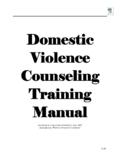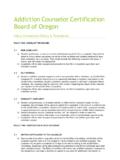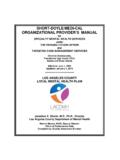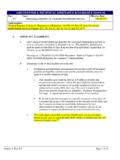Transcription of Domestic Violence Counseling Manual - Hot Peach Pages
1 Domestic Violence Counseling Training Manual Developed by Cornerstone Foundation, June, 2003. Liana Epstein, Women's Program Coordinator 0-56. TABLE. OF. CONTENTS. SECTION TOPIC PAGE. 1 Introduction 2. 2 The Nature of Domestic Violence 9. 3 Belizean Factors and Statistics 20. 4 Coping with Domestic Violence 24. 5 Legal and Medical Procedures 29. 6 Resources 43. 7 Counseling Tips 46. 1-56. SECTION 1. INTRODUCTION. 2-56. INTRODCTION. This Manual is only a beginning. It will give you the facts you need to know, tips on how to council, a rundown on the resources available in your community, and more. What it will not give you, what it cannot give you, is the look of pure fear in the eyes of a woman living with abuse, the blue and purple swollen face of a woman who's husband threw a pot at her head last night, the tears of a child who has watched his father beating his mother almost to the point of death.
2 These are the things that you will be faced with as a counselor that no one can prepare you for. As a counselor, you are giving your counselees the courage to dream of a better life, and someone to talk to just when they were beginning to think that there was no hope left. The people you will talk to will be at rock bottom, and you are a tunnel to the light. You can't drag them there, but you can show them the way. This is not to say that you are superior, we're all human, and all equal, but only that you have gifts that you can share with them: hope, belief, acceptance, and a friendly ear. Counseling , like most other things, comes easier with practice. Use this Manual as a starting point and a guide, and use your heart, your guts, and you intelligence to fill in the gaps. Through your work as a counselor you are helping not only individuals, but your community as well.
3 Human nature may have its ugly side, but you stand on the side of a brighter, better future. On behalf of the victims of abuse and society in general, thank you for your courage. MYTHS. The perpetuation of myths about Domestic Violence are dangerous not only because they encourage social acceptance and apathy towards the problem, but also because many women believe them which leads them to justify, minimize or deny the Violence they are experiencing. This prevents the vital step of acknowledging that they are in a dangerous and violent situation, which is an essential step towards seeking help. Therefore, it is essential to dispel these myths both in the community at large and with individual counselees. The following are some of the most common myths that you will encounter: 1. It's just the odd Domestic tiff. All couples have them.
4 It is true that all couples have disagreements at some point in their relationship. However, a relationship that involves Violence amounts to more than a disagreement and is based on an imbalance of power and control. A relationship that is healthy, which includes the occasional verbal disagreement, is based on respect, trust, support and love for the other. Domestic Violence involves constant or cyclic physical, sexual, emotional, psychological and financial abuse. There is no room for any such abuse in a healthy relationship. It is harmful and dangerous. In England and Wales between one and two women are killed by their partners every week - unfortunately there are no corresponding statistics for Belize. 2. It can't be that bad or she'd leave.. As listed previously, there are many, many reasons why a woman stays with her abuser.
5 In Belize the practical hindrances to leaving an abuser are greater because there are not the same support services that are in place in most western countries. 3-56. 3. Domestic Violence only happens in working class families . Although it is argued that poverty exacerbates Domestic Violence , in the sense that a woman's options of other financial and practical support are very limited or non-existent, and that financial problems can place strain on a relationship, those involved in it and a family, it is not true that it is a problem specific to poorer families. Domestic Violence cuts across all boundaries: economic (class), social, ethnic, cultural, religious and professional. Many women who have careers are abused and caught up in the same cycle of abuse as women who work at home. Factors of dependency and opportunity may differ but the psychological effect of abuse is the same.
6 4. Abusers must come from violent backgrounds.. Whilst there is a recognized pattern of abusers and abused continuing to abuse and be abused in their adult lives, it is not always the case. Many abusers do not come from violent backgrounds, and many families in which Violence occurs do not produce violent men. The family is not the only formative influence on behavior. Furthermore, this statement is dangerous because it can be used as an excuse for the abuser's behavior, both by the abuser and the abused. The abused may be more likely to accept her abuser's behavior because she can rationalize it in this way, which in turn may lead to self- blame. This attitude also encourages the abuser to rationalize his behavior, prevents him from accepting responsibility for it and from seeking help to change it. Ultimately, adults are responsible for their own actions and have a choice in how they behave.
7 5. All abusers are alcoholics or drug addicts, it's the drug that causes the Violence .. Alcohol or drug abuse is often mistakenly perceived as a cause of Violence . An abuser may say that he lost control or didn't know what he was doing because of his alcoholism or drug abuse, but he is, nevertheless responsible for his actions. The drug may reduce the abuser's inhibitions, but his actions are his own, not the drug's. While substance abuse is related to violent behavior, successful treatment of that problem will not necessarily put an end to the Violence . The abuser uses alcohol or drugs as one more excuse or justification for his actions, one more way to avoid taking responsibility for his own actions. This is a particularly potent myth reinforced by bogus studies such as the study done by Joseph Iyo, (1998, October) for the Belize Organization for Women and Development.
8 Because he found a correlation between alcohol and Domestic Violence , he leapt to the incorrect conclusion that it caused Domestic Violence . 6. She must ask for it/ deserves it/ provokes it.. This attitude unfairly shifts the responsibility of abuse from the abuser to the abused. Many women who are abused over a prolonged period of time start to rationalize the abuse, this includes feeling she is to blame for it. Furthermore, if her abuser constantly tells her that she provoked the abuse, if social opinion accepts this excuse, and if he will not accept responsibility for his actions, then she is likely to accept blame. Usually the battered wife will actually make extraordinary efforts to pacify their husbands. The abuser uses their abuse as a way to release tension and assume control; it is not a rational act. The following is an exaggeration, but image if a robbery victim underwent the same sort of cross- 4-56.
9 Examination a rape victim or a battered woman does. Would he report the crime? -- Mr. Smith, you were held up at gun point at the corner of First and Main? . Yes.. -- Did you struggle with the robber? . No.. -- Why not? . He was armed.. -- How did you know that? Did he pull out a gun or a knife? . No, but he threatened to kill me.. -- Then you made a conscious decision to comply with his demands rather than resist.. Yes, but . -- Did you scream? Cry out? . No, I was afraid.. -- I see. Have you ever been held up before? . No.. -- Have you ever given money away? . Yes, of course.. -- And you did so willingly? . What are you getting at? . -- Well, let's put it like this, Mr. Smith. You've given money away in the past. In fact, you have quite a reputation for philanthropy. How can we be sure you weren't contriving to have your money taken away by force?
10 Listen, if I wanted to . -- Never mind. What time did this hold-up take place? . About 11 pm.. -- You were out on the street at 11 pm? Doing what? . Just walking. I had just come out of a bar where I'd been drinking with the defendant.. -- Did you know the defendant before this evening? . No, I had just met him at the bar.. -- Who paid for the drinks? . We each paid for one round.. -- So you showed him that you were carrying a lot of money.. But, well, yes, but no, I didn't . -- So you were just walking. You know it's dangerous to be out on the street that late. Weren't you aware that you could have been held up? . I hadn't thought about it.. -- You hadn't thought about it? And what were you wearing? . Let's see a suit. Yes, a suit.. -- An expensive suit? A three-piece suit? . Well, yes, I'm a successful lawyer, you know.. -- In other words, Mr.






